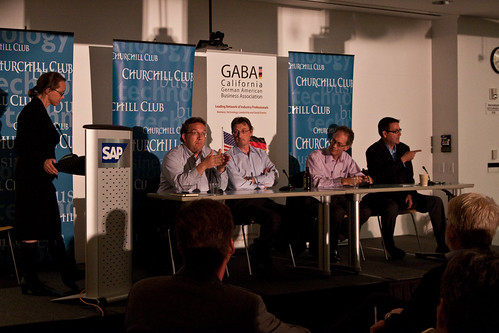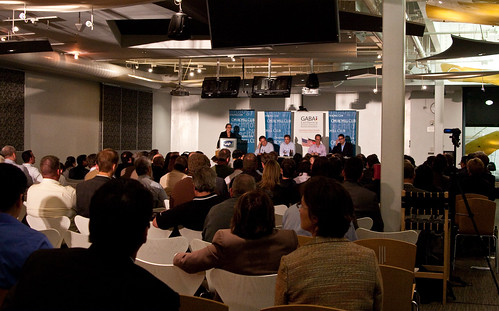Last night I had the pleasure of opening another panel discussion on Cloud Computing. This time the panel was part of SAP’s Virtualization Week 2010 and moderated by Rachel Chalmers, Research Director at “the 451 group”, an independent technology-industry analyst company focused on the business of enterprise IT innovation. On the panel we had executives from SAP, Citrix, T-Systems, and AT&T Business Solutions.

I remember that in 2005 I had organized the first panel for GABA on a similar topic, only that at the time we called it Adaptive or Utility Computing and not Cloud Computing. Obviously Cloud Computing seems to be a more popular term and I wonder who started it. Was it Salesforce.com or Google or Amazon? It was definitely not SAP, they just adopted this term because it seems to be more than just another buzzword du jour.
The lively discussion about cloud related issues like security, bandwidth, certifications, cloud standards and others made very clear that Cloud Computing for enterprises, especially Cloud Computing for SAP, is not the kind of Cloud Computing we are all familiar with from Google. Who cares what happens with your data, when your Google search command ends up in a public cloud. All we care about is a precise answer in a timely manner. And although this requirement may also be true for any SAP user, you want to make sure that your data stays in the country and is secure at any time. But is data more vulnerable when it resides in a cloud rather than in your own data center? Our panelists seem to think that there is no perfect security solution and there will always be somebody trying to break though your fire wall.
However, companies like AT&T and Deutsche Telekom (T-Systems’ mother ship) are not only investing millions of dollars into more bandwidth, but also in high-security data centers. The buyer’s expectation is to lower the cost of ownership, increase ease of consumption and fast time to value.

Under Rachel’s excellent moderation, panelists discussed the shift from on premise to on demand computing, and from upfront to as needed consumption of compute power: Customers want flexibility even if it is only a hybrid approach to Cloud Computing, e.g. keeping core applications in-house and sending edge applications into the cloud. Another good first step for companies to experience the cost savings and agility of Cloud Computing would be using the cloud for their batch processes or peek situations. Large corporations offering HR Self Services to their employees during the Open Enrollment period at the end of the year, utilities sending out millions of invoices at the end of each month, e-commerce retailers coping with Back to School or Holiday Season demands... these are all opportunities for Cloud Computing
What I personally took home from this event is that Cloud Computing is no longer just a hype – it is reality. It may not yet be perfect, but it is a great way of lowering a company’s total cost of ownership coming with agility and better performance. I know that this will not be the last panel discussion on Cloud Computing for GABA. The mid-market customer is expecting SaaS Software-as-a-Service, where a user wouldn’t have any upfront investments but only pay what he uses - SAP from tap, so to speak. Stay tuned.
 Sincerely,
Sincerely,Uwe Wagner
GABA Software Co-Chair and Principal & Founder of Tiburon Consulting LLC





